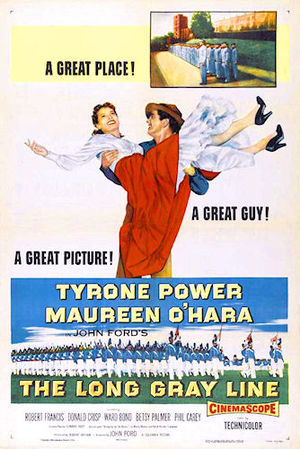
THE LONG GRAY LINE
US, 1955, 138 minutes, Colour.
Tyrone Power, Maureen O'Hara, Robert Francis, Donald Crisp, Ward Bond, Betsy Palmer.
Directed by John Ford.
The Long Gray Line is a strong, sentimental tribute to West Point and the American heritage and patriotism that it embodies. Veteran director John Ford uses some of his favourite actors and actresses in this biography of Marty Maher, Irish instructor and character, finely played by Tyrone Power. Ford is noted most for his Westerns, but this film is typical of his interests and style.
1. Is this a family film? For Americans or overseas audiences, with its strong emphasis on traditional values.. atmosphere of patriotism?
2. The atmosphere of a 50's film for the family? John Ford as a classic director and his presentation of America, its values, sentiment? What were the major American values that the film took for granted? How well were they presented and explored? The role of sentiment, sentimentality?
3. The use of colour and Cinemascope; a long epic film? The use of music, military songs, Irish songs? The military band?
4. The flashback technique. the presentation of history. the sentiments involved in a successful long career? A picture of the first part of the 20th century in America?
5. The appeal of a biography and understanding of a personality's life? Marty Maher and his memories? The opening, and his being very Irish? Naive? The Irishman observing life at West Point? What kind of person was he. his goodness. earnestness, his work and the clashes in the kitchen? His encounter with the officer? Were these qualities carried through during his career?
6. The ironic consequences of the clashes? His gradual involvement: after joining the army, in the way of life at West Point? His loyalty, his love for the life. the men? His role as swimming coach? Other sports? Why did he fit into this role at West Point? Other people's regard for him? His concern for those under him? His qualities manifest in sports training? The advice that he gave to the young men, even to giving up sport for their studies? The impact of World war I at West Point and on him? The Master of the Sword enlisting? His staying on to carry the traditions? His disappointment at his non-involvement? His sadness for those who had died? The questions of his loyalty, the temptations to leave?
7. How attractive was Mary O’Donnell? As a person, her complicity in the plot to marry Marty Maher? The happiness of their marriage? Her fitting into the way of life at West Point? The happiness and expectations for the child? The sadness of its death and her ability to cope with this, and help Marty? Red as a substitute child? Her involvement in the life at West Point, sentiment and feeling at her death?
8. The personalities of the men at West Point? how well were they detailed, how interestingly? Red and the others? Their values at west Point. their drives to excel in the army? Their response to war and their deaths?
9. The importance of the subplot with Kitty and Red? Their meeting at the Maher's house. their romance and marriage? The sadness of such a short marriage? The compensation of the child? Kitty's decision to go to West Point? The complications of their later life? Red's marriage and its annulment? His going to war? Kitty's pride?
10. The role of old Mr. Maher in the film? The Irish immigrant. the patriarch in the house? His happiness at West Point? The humour of his enlisting?
11. What had Marty Maher achieved as a person? As a personality at West Point by the time of his retirement? The importance of the Christmas tribute and the final parade?
12. Comment on the film as a history of the academy of West Point: as a tribute to West Point, the American army and its tradition, patriotism and its values, the critique implied by the visit of the youngest governor to the Institute and Marty's reply.
13. How good has the achievement of West Point been? Was this film an appropriate tribute?